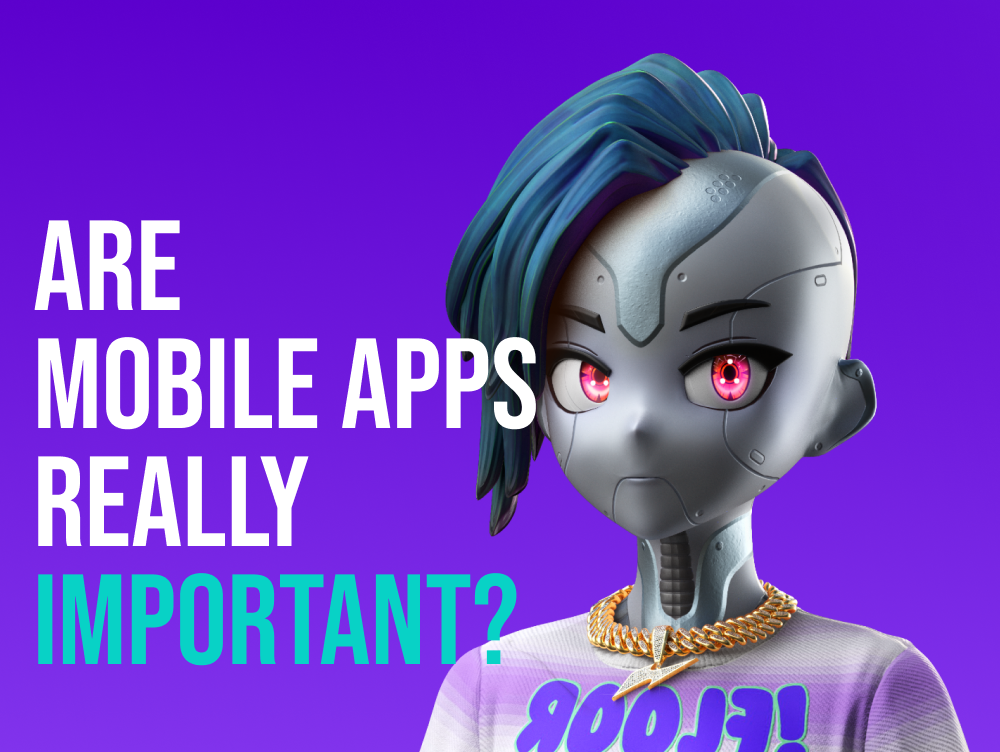Having Mobile App for Your Business Is Important?
Why Does Every Business Need a Mobile Application?
all
mobile
app

Are Mobile Apps Important?
Mobile App
An app or mobile application is a computer application specifically designed for use on a mobile device, such as a mobile phone, tablet, or even a watch. Mobile apps often are against desktop applications built to run on desktop computers and web-based applications that run on mobile web browsers instead of directly to the mobile device.
Apps were initially designed to provide help with productivity, such as calendars, email, and contact databases. However, the demand from users for apps led to rapid expansion into other fields like mobile games factories automatization, GPS, and location-based services such as order tracking and tickets, so there are currently millions of apps to download. Most apps require Internet access. The majority of apps are downloaded through app stores, which are a kind of distribution system that is digital.
Mobile apps have had a profound impact on the way companies operate. By 2020, nearly 3.5 billion people around the world will have smartphones. Mobile apps present the most effective, simple, and flexible method to communicate product information and help customers stick with an individual brand.
Why Does Every Business Need a Mobile Application?
Businesses are constantly fighting to earn respect and trust of their clients. The battle to provide the most appealing product to a more significant market is never-ending. Therefore, in an ever-changing environment, it is inevitable that the winner will end up having the most efficient and efficient communications channels with their clients.
In turn, companies have realized the necessity of attracting customers using effective mobile channels. However, that's not enough. It is also necessary to improve their mobile applications or websites to enhance customer satisfaction and surpass conversions to use the channel.
#1 Mobile apps provide better personalization
Personalization seeks to provide personalized communications to users based on their preferences, location, patterns of use, and much more.
Mobile apps make it simple to provide users with an individual experience. The mobile application A/B testing tool is a great way to try different user experiences for your clients.
Mobile apps allow users to establish their preferences from the beginning, based on which they can be presented with personalized content. Apps also can track customer interaction and then use it to give personalized suggestions and notifications to users. Additionally, they can determine users' location in real-time to deliver specific content for the user's location.
But, improving user experience isn't the only goal that personalization has. It can also increase rates of conversion of apps.
If people are treated to unique content, they stand an increased chance of conversion because it gives them the human touch, unlike generic content that appears automated or robotic.
#2 Easy to send notifications
For the past two decades, email has been one of the most commonly used tools for communication in business. Many businesses have utilized email (some nearly made use of it) for communicating with their customers. Email is no longer as effective as it once was; its opening and click-through rates steadily declined.
There's nothing to be concerned about.
Get mobile app notifications. These messages come in two kinds that are Push and In-App. Both are fantastic options for interacting via the app less intrusively.
The ability to instantly send non-intrusive and non-intrusive notifications on users' smartphones is attractive because it's among the main reasons enterprises initially want an app for mobile devices.
In-app notifications are notifications that users will only get when they've opened an application. However, push notifications are the notifications that users get regardless of what they're doing on their mobile devices.
There have been cases when the notification via push has resulted in a click-through rate of 40 percent. If you opt for an app that is mobile-friendly or has one in the process of building an application, it is possible to send push notifications.
Join to try it for free and discover how simple it is to notify users of your desktop and mobile users.
#3 Utilizing mobile device features
Mobile apps benefit from using features of the mobile device, such as a camera, contact list, GPS, calls to a number and accelerometers, compasses, and more.
These devices can make the user experience fun and interactive when integrated into an app.
Furthermore, these tools could reduce users' effort to put in otherwise. For instance, a user filling out an application in a banking app may require submitting photos to complete the form. The app could allow users to use smartphone cameras to take and upload images.
The interconnected features drastically reduce the time needed to perform specific tasks in an application and increase conversion rates.
Mobile websites can also utilize certain smartphone functions, like cameras, GPS, etc. However, there are some privacy issues and technological restrictions when using multimedia features on the device (which mobile apps may utilize).
#4 Ability to work offline
It's an essential difference between a mobile-friendly website and an application.
As with websites, apps also require an internet connection to accomplish many tasks. However, this is different: an application can provide basic information and functions to users even while offline.
Let's consider the case of a bank app.
The app can provide installment calculations, tax calculations, and loan limits. These features can function even without access to the Internet.
Note: Although mobile websites can use caching to load webpages without internet connectivity, They can only provide limited functionality.
#5 Freedom in designing
With all the advancements in technology in web design, mobile websites have to rely on browsers to accomplish even the most basic tasks. Mobile websites rely on browser features such as "back button," "refresh button, " and "address bar " to perform their tasks.
Mobile applications, however, do not have these restrictions.
Mobile apps are built with various complex functions based on advanced gestures, such as swipe, tap or drag, pinch and hold, and much more.
Apps can use these gestures to provide unique features that will aid users in performing their job more efficiently. For example, an application could allow users to go from one step to another step by using tapping.
#6 Branding experience with a new look
Since mobile apps are distinct from a company's website, It has the freedom of providing a brand new experience for users. This means the business can experiment with different branding designs for the app that may differ from the standard design of the company's website (or the entire company).
Moving on, companies can develop mobile apps that specifically help them transition to a new style of branding their own.
In addition, mobile apps will also let users alter their appearance under the user's preferences. This will further aid in the personalization aspects of the application.
Note: The idea behind microsites operates similarly. Microsites provide distinct brand experiences for users in comparison to their parent websites. They're typically used for advertising an event, a sub-brand, or a brand new service.
#7 Users are more likely to spend time on apps
Users of mobile devices spend around 88 percent of their time on mobile applications and only 12 percent of their time on mobile-friendly websites.
One thing to be considered here is that gamers spend much time using games and social media applications.
#8 Conversion stream with a new flow
If you are looking to boost the number of conversions, you can use mobile apps. They are an excellent method to get users to the funnel of conversion.
Mobile apps are a great way to gain customers at the top of the funnel (ToFu) and bottom of the funnel (BoFu).
For instance, utility applications could bring in users from ToFu who can later be converted into BoFu leads. On the other hand, applications like eCommerce currently have BoFu customers with a greater likelihood of conversion.
Additional Information: Mobile apps are more targeted (through their content and utility) and have more utility. You can utilize them to reach specific users on the funnel. On the other hand, mobile websites can reach out to many users.
#9 Brand's brand presence
Users spend a large portion of their time using mobile devices. It's possible to say that many users use the apps installed on their devices nearly every Day. Every Day, they are an opportunity to promote the apps.
Even when the user isn't engaged in using the app and is not actively using it, they are reminded of the brand name associated with the app. The icon for the app is an advertisement to promote the company.
The presence of apps on any device will influence users' perception of the company.
This user behavior is influenced by the Signal Detection Theory, which suggests that users can process advertisements that they had previously dismissed in their brains.
#10 Apps work better
A well-designed mobile application can complete tasks faster than a mobile-friendly website.
Most apps save their data on mobile devices locally compared to websites that typically use web servers. Because of this, data retrieval can be done quickly within mobile applications.
Apps also help users save time by keeping their preferences in a database and taking proactive action on behalf of users.
There's also a technical reason why mobile apps work faster. Mobile websites utilize Javascript code to carry out most of their tasks, and the framework mobile apps run five times more quickly than Javascript-based code! Even though all this takes place within the background, the users can expect to complete their actions faster in front-end mobile apps, contributing to a pleasant user experience.

